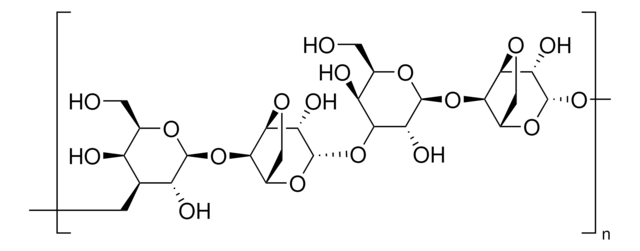A4679
Agarose
Low EEO, for Immunoelectrophoresis
Synonym(e):
3,6-Anhydro-α-L-galacto-β-D-galactan, Agarose LE
About This Item
Empfohlene Produkte
Biologische Quelle
algae (Gelidium)
Qualitätsniveau
Form
powder
Methode(n)
electrophoresis: suitable
immunodiffusion: suitable
immunoelectrophoresis: suitable
Verunreinigungen
≤7% water
EEO
0.09-0.13
mp (Schmelzpunkt)
88 °C±2 °C (1.5% gel)
Übergangstemp.
gel point 34-38 °C (1.5% gel)
Gelstärke
≥1200 g/cm2 (1% gel)
Anionenspuren
sulfate (SO42-): ≤0.20%
InChI
1S/C24H38O19/c25-1-5-9(27)11(29)12(30)22(38-5)41-17-8-4-36-20(17)15(33)24(40-8)43-18-10(28)6(2-26)39-23(14(18)32)42-16-7-3-35-19(16)13(31)21(34)37-7/h5-34H,1-4H2/t5-,6-,7+,8+,9+,10+,11+,12-,13+,14-,15+,16-,17-,18+,19+,20+,21-,22+,23+,24+/m1/s1
InChIKey
MJQHZNBUODTQTK-WKGBVCLCSA-N
Suchen Sie nach ähnlichen Produkten? Aufrufen Leitfaden zum Produktvergleich
Verwandte Kategorien
Allgemeine Beschreibung
Anwendung
Angaben zur Herstellung
1. Prepare a 1% agarose solution (sufficient for 10 gels 85 mm x 100 mm, 1-1.5 mm thick) by mixing 1.5 g agarose (Catalog No. A4679) in 150 mL of prepared barbital buffer and heat in a boiling water bath until completely dissolved.
2. To prepare one gel, pour 14 mL of agarose solution onto the hydrophilic side of a level, well supported 85 mm x 100 mm sheet of Electrophoresis Film for Agarose Gels (Catalog No. E0264). Pour from the center of the sheet toward its edges forming an even layer of agarose 1-1.5 mm thick.
3. Allow the gels to harden for one hour at 4 °C before using or store at 0-5 °C in an appropriate, plastic wrapped container.
Hinweis zur Analyse
Sulfatgehalt - dient als Indikator für die Reinheit, da Sulfat die hauptsächlich vorhandene Ionengruppe ist.
Gelstärke - die Kraft, die aufgewendet werden muss, damit ein Gel zerbricht.
Gelierpunkt - die Temperatur, bei der die wässrige Agaroselösung beim Abkühlen geliert. Agaroselösungen zeigen beim Übergang von der Flüssigkeit zum Gel Hysterese - das bedeutet, dass die Temperatur des Gelierpunkts nicht dieselbe ist wie die Schmelztemperatur.
Elektroendosmose (EEO) - Bewegung einer Flüssigkeit durch das Gel. Anionische Gruppen sind in einem Agarosegel an die Matrix gebunden und können sich nicht bewegen, aber dissoziierbare Gegenkationen können in der Matrix in Richtung der Kathode wandern und führen zu EEO. Da die elektrophoretische Bewegung der Biopolymere normalerweise in Richtung der Anode stattfindet, kann EEO die Auftrennung aufgrund von interner Konvektion stören.
WGK
WGK 3
Flammpunkt (°F)
Not applicable
Flammpunkt (°C)
Not applicable
Persönliche Schutzausrüstung
Eyeshields, Gloves, type N95 (US)
Analysenzertifikate (COA)
Suchen Sie nach Analysenzertifikate (COA), indem Sie die Lot-/Chargennummer des Produkts eingeben. Lot- und Chargennummern sind auf dem Produktetikett hinter den Wörtern ‘Lot’ oder ‘Batch’ (Lot oder Charge) zu finden.
Besitzen Sie dieses Produkt bereits?
In der Dokumentenbibliothek finden Sie die Dokumentation zu den Produkten, die Sie kürzlich erworben haben.
Kunden haben sich ebenfalls angesehen
Verwandter Inhalt
Nancy-520 for DNA Detection and Quantitation
Unser Team von Wissenschaftlern verfügt über Erfahrung in allen Forschungsbereichen einschließlich Life Science, Materialwissenschaften, chemischer Synthese, Chromatographie, Analytik und vielen mehr..
Setzen Sie sich mit dem technischen Dienst in Verbindung.
